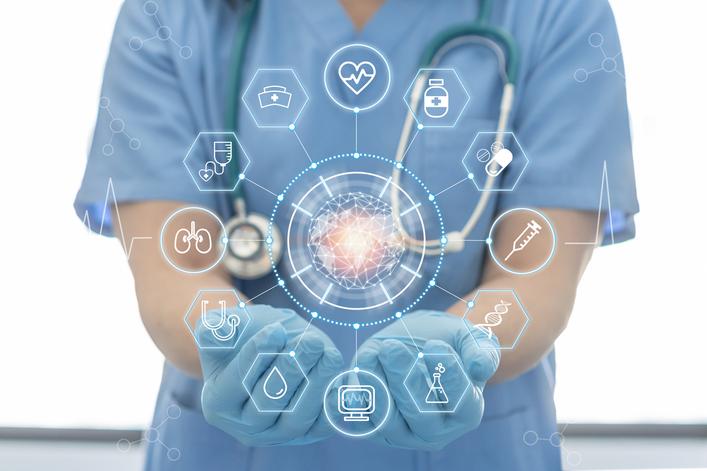Artificial Intelligence: “From challenges to opportunities”
"Doctors are still a long way from understanding what Artificial Intelligence means." This was stated by Paulino Cubero, member of the Board of Directors of the Federation of Spanish Medical Scientific Associations (FACME), on October 14, during the Conference of es COSCE 2021 "Artificial Intelligence: from challenges to opportunities".
However, beyond the challenges that Spain still has to face in terms of this technology, the fifteen experts who attended the conference addressed Artificial Intelligence (AI) from its most positive side. Cubero, for example, also recalled how 25 years ago the folders of the consultations were getting fatter with papers made by hand, which contained the data of each patient. And, as if this were not enough, he himself did not understand that doctor's handwriting.
Nothing to do, he indicated, with the ease that the application of Artificial Intelligence now presents when building databases with the records of all patients.
"In order for this technology to respond to the needs of professionals and patients, the doctor has to be present from the beginning of the digital design," Cubero stressed, emphasizing that there is a long way to go to position ourselves at the same level as other sister countries.
This aspect was also highlighted by the Secretary General for Research of the Ministry of Science and Innovation, Raquel Yotti, as a benefit when it comes to empowering the patient and making them responsible for their own health.
“Artificial Intelligence allows you to take responsibility for your health. Being able to have access to your own data and being able to analyze and interpret it empowers the patient and has very identifiable consequences in terms of quality of life.”
Likewise, Yotti presented Artificial Intelligence as a tool for optimizing workflows and resource distribution. In a health system in which time is scarce, "going case by case, counting sticks, as the oldest epidemiologists in the place say" is no longer viable.

To get a little closer to the reality of the population, Elisa Martín, director of the Health area at the Institute of Knowledge Engineering, gave the case of sepsis as an example. A disease that responds in an overwhelming and extreme way to an infection and that, in addition, is responsible for 8 million deaths in the world every year.
“With AI we will be able to alert a doctor that a patient is going to develop sepsis in the next 72 hours. That is to say, we are going to increase subsistence capacities”, reasoned Martín.
a dependent technology
Until the end of the 20th century, human intelligence was the most effective instrument for processing a growing but manageable volume of information. With the 21st century, however, there has been an exponential growth in available data, which has led to the development of new processing systems, much more efficient than our minds in terms of data volume and speed.
Brentwood High School students need a lesson on how to throw a proper Senior prank. #FAIL Just saying, KIDS these days...
— Get it, let it Rol ⁷ Mon Jun 04 15:04:28 +0000 2012
A situation that has led to significant changes in the interpretation of reality, less and less human, since the new system is based on "inorganic", which is why it is known as Artificial Intelligence.
In the words of Juan Francisco Jimeno, a researcher at the Bank of Spain, AI is the ability of a machine to imitate intelligent human behaviour. Autonomous algorithms, explained Jimeno, that carry out certain tasks and that can even replicate and extend themselves.
This type of digital transformation, which has separated the human being from certain tasks, has created controversy since its appearance. Will they end up surpassing the human being? Are they ethical? Do they destroy jobs?
The speakers made their position clear: it is a technology created by human beings, so artificial intelligence and its ethics will always depend on it. Likewise, they clarified that, although it destroys a large number of jobs, it generates an even greater number and with better job profiles, that is, more qualified.
"The early evidence we have shows that AI is not being as disruptive as people feared in terms of wage and salary losses."
Applied to the environment
Beyond the field of health, Artificial Intelligence also brings great benefits to the environment. As explained by Matilde Barón, Zaidín-CSIC Experimental Station and Antonio Plaza, Professor at the University of Extremadura, this technology allows precision agriculture.
“For farmers it means visualizing the parameters of their farms in real time. Increase their activity, reduce costs and reduce effort, which is very important”, lists Matilde Barón.
"In addition -continued the expert-, it also allows them to harvest the crop at the right time, and efficiently plan planting, irrigation, fertilization and amendments".
In reference to the current situation in the country, the Secretary of State for Digitization and Artificial Intelligence, Ministry of Economic Affairs and Digital Transformation, Carme Artigas, assured that Spain is prepared to take on this technological change and that it is one of those "great opportunities that our country cannot let go."
During her speech, the Secretary of State stated that Spain is firmly committed to leading the development of "artificial intelligence focused on people, innovation, entrepreneurship and its integration into the value chains of our productive fabric" . To this she added that "we must launch a new model of a more digital, green and inclusive country, which is what we want to build over the next decade."
Artificial Intelligence, therefore, “will improve health care, increase the efficiency of precision agriculture, of production systems and will also contribute to the mitigation of climate change and the prediction of many aspects. In addition, it will bring us many other changes that, for the moment, we may not be able to include or believe”, concluded L. Alfonso Ureña, member of the Spanish Confederation of Women Scientists (COSCE).
